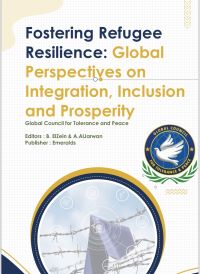By H.E. Ahmed Mohamed Al Jarwan
President, Global Council for Tolerance and Peace
As we celebrate World Refugee Day under the theme “Solidarity with Refugees,” it is an opportune moment to introduce our newly accepted book, “Fostering Refugee Resilience: Global Perspectives on Integration, Inclusion, and Prosperity.” This book, developed by the Global Council for Tolerance and Peace and authored by a diverse group of experts, addresses the critical aspects of refugee resilience and integration through an interdisciplinary lens.

Authored by experts from various entities, including the United Nations High Commissioner for Refugees (UNHCR), national parliaments, and universities such as Ss. Cyril and Methodius University of Skopje, Universidad Católica de Murcia, Tecnológico de Monterrey, and SEE-University, this book brings together a wealth of knowledge and experience to address the multifaceted issues related to refugees. It provides a comprehensive analysis of the various challenges faced by refugees and offers practical recommendations for policymakers, practitioners, and communities. It emphasizes the need for a holistic approach to support refugees, highlighting key themes such as:
- Ethical and Legal Frameworks: Refugees’ rights must be safeguarded through robust ethical and legal frameworks. The book emphasizes the importance of international cooperation and the implementation of comprehensive legal protections that ensure the dignity and rights of refugees.
- Innovation and Technology: Technological advancements can play a pivotal role in addressing refugee needs. From digital literacy programs to innovative education models, leveraging technology can significantly enhance refugees’ access to essential services and opportunities for growth.
- Economic Contributions and Entrepreneurship: Refugees have the potential to contribute significantly to their host communities. By supporting refugee entrepreneurship and providing access to vocational training and financial services, we can unlock their economic potential, benefiting both refugees and host societies.
- Social Integration and Reintegration: Successful integration requires holistic support systems that address the social, economic, and cultural needs of refugees. Community-based programs that foster social cohesion and mutual understanding are vital for creating inclusive environments where refugees can thrive.
- Gender and Family Dynamics: Special attention must be given to the unique challenges faced by women and children in refugee situations. The book highlights the importance of targeted support measures that address gender-specific needs and promote the protection and empowerment of vulnerable groups.
To support refugee resilience and integration effectively, the book’s editors and authors urge policymakers, practitioners, and communities to:
- Implement robust legal protections and support systems for refugees.
- Develop and apply technological solutions to meet refugees’ educational, healthcare, and social needs.
- Provide access to vocational training, financial services, and entrepreneurial opportunities for refugees.
- Foster social cohesion and support cultural, social, and economic integration through community-based initiatives.
- Implement targeted measures to protect and empower women and children in refugee contexts.
“Fostering Refugee Resilience: Global Perspectives on Integration, Inclusion, and Prosperity” is a significant contribution to the field of refugee studies. It offers a comprehensive, interdisciplinary approach to understanding and addressing the challenges faced by refugees. By implementing the insights and recommendations from this book, we can create a more inclusive and supportive environment for refugees, enabling them to thrive and contribute to their new communities.
The Global Council for Tolerance and Peace, along with the esteemed authors of this book, remain dedicated to supporting and advocating for refugees worldwide. We hope this book serves as a valuable resource for policymakers, practitioners, and communities working to enhance refugee resilience and integration.


